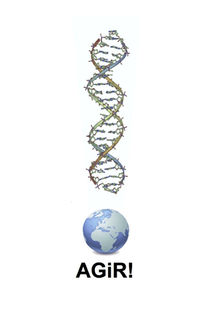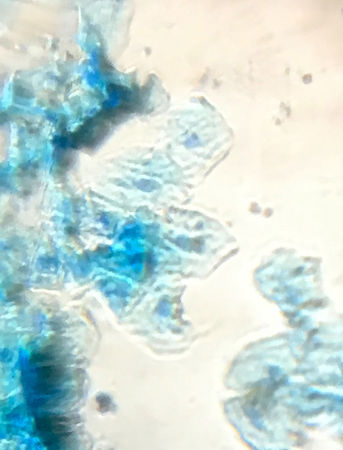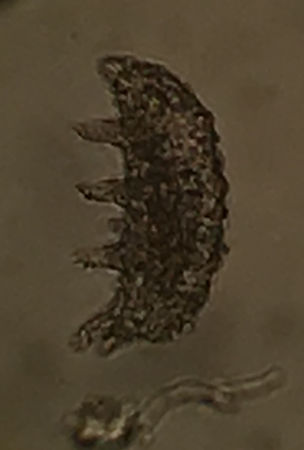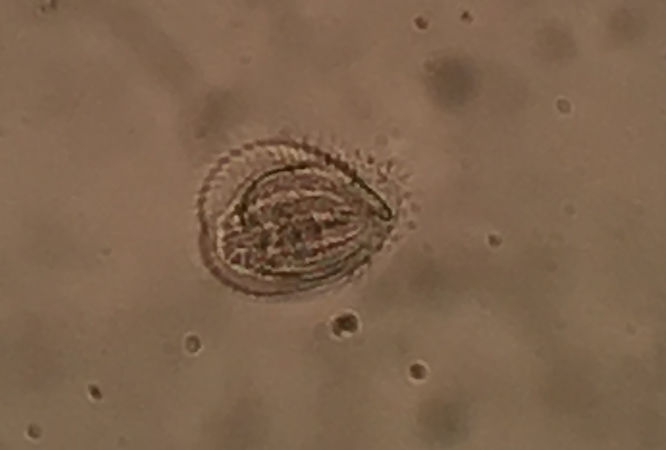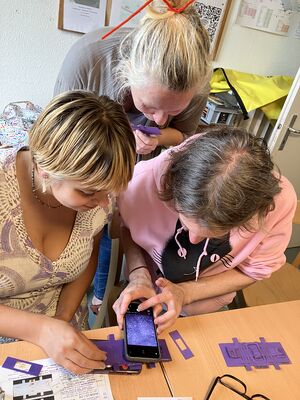Foldscope
The Genomic Integrity team has been looking into the best ways to get the cheek cell assays to be really DIYbio (for DIT research!) and has been testing open-source microscopy and imaging methods at Hackuarium:
(If someone would like to help for translations to French or other languages, please do feel free!)
Inspiration
Many DIY microscopes exist already. This page from Hackteria describes a few options out there, even using old webcam lenses, upside down...
We had great fun playing with variations on the theme, even simple lenses embedded in simple materials (like cork) during the BioFab Convergence...
(to add pic)
The first Foldscope was developed at Stanford, by the group of Manu Prakash, and was published in PLOSOne.
First Foldscope Tests at Hackuarium
The first attempts to make Foldscopes at Hackuarium relied on vector graphic files found on the internet in Oliver Bosewell's blog, and included in the folder linked below (under Further information).
We used the laser-cutter in the maker space (Made@UC Thanks, Marc!) to cut the pattern, and simple glass beads for lenses (thanks, Sachiko!) and made our first tests on 5May17.
An image of one of our first folded scopes and an image of an old histology slide can also be found in the folder linked below (under Further information). Even though the beads were 'up-cycled' from microbiology experiments (even scratched), the results seemed promising enough that low magnification (140X) borosilicate glass lenses were ordered.
The second build and an image with cheek cells stained with methylene blue is also included in the folder linked below.
Steiner School Student visit
We look forward to welcoming 18 students from the Steiner School (15-18 year old) on 22 May 2017, with their teacher, Veronica Monticone.
There are 20 packets with purple, Hackuarium-embossed pieces for the Foldscope (3 main ones), including a proper 140x lens, ready for the arrival of 18 students at 9am... :)
The handout students will receive includes spaces for developing hypotheses and controls for their chosen hands-on activities, and a new moss life spotting sheet.
They will see the simplest video on Foldscope making from the PLOSOne paper, and be recommended to explore further on YouTube.
They will also see something short on spotting moss life and the particulars of 'menagerie' viewing (most likely setting up a new one for the occasion), and will have opportunities to make, exchange and view slides of many things, even made with paper and scotch tape!
Gallery
The first image is of Methylene Blue stained cheek cells imaged with a Foldscope and iPhone...
and here is a photo album from the morning visit! (hoping to add students' best foldscope images soon!)
One more point to make after this visit, we need to try other materials, perhaps the water-proof polypropylene sheets others have already tried, instead of just thick paper for the Foldscopes. The purple paper used with the students was far from perfect, with some difficulties with 'crumpled' inserts only solved with good forceps!
Hopes to use fluorescence modules for the cheek cell assays.
With a blue LED, a diffuser, and a filter, fluorescence may be possible, which will be especially important for the cheek cell comet assays, if no colored alternative to SYBR-Safe is found. None of these components come for free, of course. Even the 140X borosilicate lenses were 1 USD each (including shipping, at least), for the simplest bright field version of the Foldscope.
Unfortunately the Foldscope team was not quick to share their latest progress in this regard.
With the oFoldscopes at GOSH2018, we hope to make more progress on DIY epifluor - we have more filters to try, also from the dis-mantled sequencer!!
and hopes that 3D printed components will make anyone's smart phone into the equiv of an epifluor rig... Instead, the OpenFlexure scope seen in Shenzhen inspired more work...
Use of Foldscopes in Cheek Cell Micronuclei Workshops
For the Edgeryder's OpenVillage Festival in Brussels 20october17, the group that joined in for my workshop on 'Opensourcing DNA damage testing' got to make Foldscopes (purple paper version) too.
For the Science has no Borders Workshops in London 26-27jan18 at UCL, which included a part on environmental sampling for microbiology in addition to the micronuclei assays, people not only got to make the DIY Foldscope but could play with one of the deluxe versions. Two participants went home with their own sets, too, for correctly answering what is most important about genomic integrity! (that it is dynamic and that it is protected...)
Both experiences were very enlightening!
Participants definitely learned more about what it takes to get useful data...
Here are some images from London...
oFoldscopes for LemanMake
still trying to decide between making mini foldscopes only for paper slides or the normal sized ones ...
laser cutting to happen 22sept for the 2 workshops to be held in Renens 29/30 sept!
We are now calling them oFoldscopes, to distinguish them from the current product versions - 'o' as in 'old school Foldscopes' :)
In the end (summary from 3oct18) the full-size 'o-Foldscopes' were made and used for the workshops! just awesome too, with about 15 kids getting excited on the Sunday (and some parents too) about how sunflower pollen looks! :)
Even brought some to GOSH2018! 7 people went home with their own oFoldscope from Shenzhen!
oFoldscopes for Bilbao
more workshops are happening in Spain January 2019
with 18 oFoldscope kits ready to make, let's see how it all goes.
for the home-made slides, we have not only the old sunflower pollen, but pollen from amarylis flowers, both red and white! (the big question is whether there will be any difference between these pollens! Of course, the null hypothesis is that there will be no obvious difference, but by the end of this weekend, we should know! Thanks to Ivan and Ricardo for their organisation and help!
Here is the info about the big weekend of open science in Bilbao.
oFoldscopes for 'Ramène ta Science' in Lausanne
For the big library in the center of Lausanne, BCUL, we had two workshop sessions making the 'old school' Foldscopes.
Everyone had a lot of fun!
oFoldscopes for 1st Kids' Club
- Our Kids' club plans got slowed down by the pandemic, but this was the announcement for the first one!
oFoldscopes for more Open Science Events...
More oFoldscopes were made in Colombia around the collaboration with Más Arte Más Acción, before the pandemic, in Darmstadt, Germany for the Ianus Peace Lab's Arthropothon in 2023, and most recently for the 'Homemade Summer Camp' (see image).
Further information
- Foldscope templates used to date (thank you OB, wherever you may be!), and further info, including our first images can be downloaded here.
- The project to assess your own cells for DNA damage at Hackuarium
- website - Action for Genomic Integrity through Research!
- Twitter account for AGiR! @AGIRgenomes
